2015.12大学英语四级考试介绍(CET4改革后最新版)
2015年12月大学英语四级考试真题及答案(第1套)
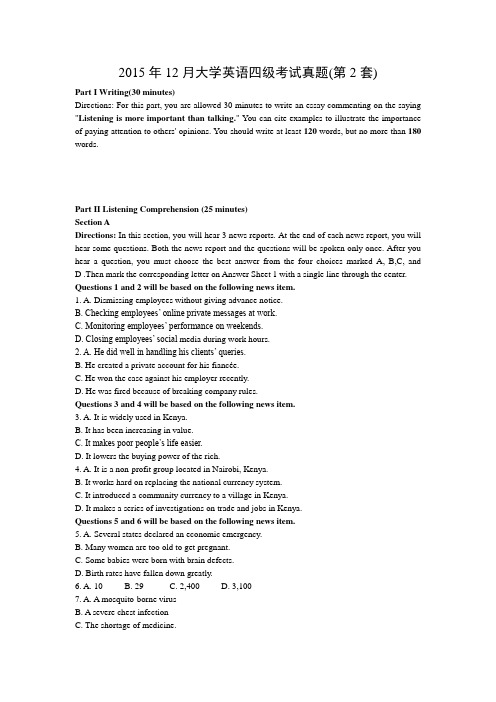
2015年12月大学英语四级考试真题(第2套)Part I Writing(30 minutes)Directions: For this part, you are allowed 30 minutes to write an essay commenting on the saying "Listening is more important than talking." You can cite examples to illustrate the importance of paying attention to others' opinions. You should write at least 120 words, but no more than 180 words._______________________________________________________________________________ _______________________________________________________________________________ _______________________________________________________________________________Part II Listening Comprehension (25 minutes)Section ADirections: In this section, you will hear 3 news reports. At the end of each news report, you will hear some questions. Both the news report and the questions will be spoken only once. After you hear a question, you must choose the best answer from the four choices marked A, B,C, and D .Then mark the corresponding letter on Answer Sheet 1 with a single line through the center. Questions 1 and 2 will be based on the following news item.1. A. Dismissing employees without giving advance notice.B. Checking employees’ online private messages at work.C. Monitoring employees’ performance on weekends.D. Closing employees’ social media during work hours.2. A. He did well in handling his clients’ queries.B. He created a private account for his fiancée.C. He won the case against his employer recently.D. He was fired because of breaking company rules.Questions 3 and 4 will be based on the following news item.3. A. It is widely used in Kenya.B. It has been increasing in value.C. It makes poor people’s life easier.D. It lowers the buying power of the rich.4. A. It is a non-profit group located in Nairobi, Kenya.B. It works hard on replacing the national currency system.C. It introduced a community currency to a village in Kenya.D. It makes a series of investigations on trade and jobs in Kenya.Questions 5 and 6 will be based on the following news item.5. A. Several states declared an economic emergency.B. Many women are too old to get pregnant.C. Some babies were born with brain defects.D. Birth rates have fallen down greatly.6. A. 10 B. 29 C. 2,400 D. 3,1007. A. A mosquito-borne virusB. A severe chest infectionC. The shortage of medicine.D. Bacteria from Latin America.Section BDirections :In this section, you will hear two long conversations. At the end of each conversation, you will hear four questions. Both the conversation and the questions will be spoken only once. After you hear a question, you must choose the best answer from the four choices marked A, B, C, and D.Then mark the corresponding letter on Answer Sheet 1 with a single line through the center. Conversation OneQuestions 8 and 11 are based on the conversation you have just heard.8.A.It is used by more people than English.B.It is more difficult to learn than English.C.It will be as commonly used as English.D.It will eventually become a world language.9.A.Its popularity with the common people.B.The effect of the Industrial Revolution.C.The influence of the British Empire.D.Its loan words from many languages.10.A.It has a growing number of newly coined words.B.It includes a lot of words from other languages.C.It is the largest among all languages in the world.D.It can be easily picked up by overseas travelers.11.A.The English grammar is quite easy.B.It is greatly influenced by French.C.It could be pronounced easily.D.It is attractive to English beginners.Conversation TwoQuestions 12 and 15 are based on the conversation you have just heard.12.A.To place an order.B.To apply for a job.C.To return some goods.D.To make a complaint.13.A.He works on a part-time basis for the company.B.He has not worked in the sales department for long.C.He is not familiar with the exact details of the goods.D.He has become somewhat impatient with the woman.14.A.It is not his responsibility.B.It will be free for large orders.C.It depends on a number of factors.D.It costs£15 more for express delivery.15.A.Make inquiries with some other companies.B.Report the information to her superior.C.Pay a visit to the saleswoman in charge.D.Ring back when she comes to a decision.Section CDirections: In this section, you will hear 3 short passages. At the end of each passage, you willhear some questions. Both the passage and the questions will be spoken only once. After you hear a question, you must choose the best answer from the four choices marked A , B ,C. and D. Then mark the corresponding letter on Answer Sheet 1 with a single line through the centre.Passage OneQuestions 16 to 18 are based on the passage you have just heard.16.A.No one knows for sure when they came into being.B.No one knows exactly where they were first made.C.No one knows for what purpose they were invented.D.No one knows what they will look like in the future.17.A.Measure the speed of wind.B.Give warnings of danger.C.Pass on secret messages.D.Carry ropes across rivers.18.A.To find out the strength of silk for kites.B.To test the effects of the lightning rod.C.To prove that lightning is electricity.D.To protect houses against lightning.Passage TwoQuestions 19 to 22 are based on the passage you have just heard.19.A.She was born with a talent for languages.B.She was tainted to be an interpreter.C.She can speak several languages.D.She enjoys teaching languages.20.A.They want to learn as many foreign languages as possible.B.They have an intense interest in cross-cultural interactions.C.They acquire an immunity to culture shock.D.They would like to live abroad permanently.21.A.She became an expert in horse racing.B.She learned to appreciate classical music.C.She was able to translate for a German sports judge.D.She got a chance to visit several European countries.22.A.Take part in a cooking competition.B.Taste the beef and give her comment.C.Teach vocabulary for food in English.D.Give cooking lessons on Western food.Passage ThreeQuestions 23 to 25 are based on the passage you have just heard.23.A.He had only a third-grade education.B.He once threatened to kill his teacher.C.He often helped his mother do housework.D.He grew up in a poor single-parent family.24.A.Stupid.B.Active.C.Brave.D.Careless.25.A.Watch educational TV programs only.B.Write two book reports a week.C.Help with housework.D.Keep a diary.Part Ⅲ Reading Comprehension(40 minutes)Section ADirections : In this section, there is a passage with ten blanks. You are required to select one word for each blank from a list of choices given in a word bank following the passage. Read the passage through carefully before making your choices. Each choice in the bank is identified by a letter. Please mark the corresponding letter for each item on Answer Sheet 2 with a single line through the center. You may not use any of the words in the bank more than once.Questions 26 to 35 are based on the following passage.Scholars of the information society are divided over whether social inequality decreases or increases in an information-based society. However, they generally agree with the idea that inequality in the information society is 26 different from that of an industrial society. As information progresses in society, the cause and structural nature of social inequality changes as well.It seems that the information society 27 the quantity of information available to the members ofa society by revolutionizing the ways of using and exchanging information. But such a view is a28 analysis based on the quantity of information supplied by various forms of the mass media. A different 29 is possible when the actual amount of information 30 by the user is taken into account. In fact, the more information 31 throughout the entire society, the wider the gap becomes between "information haves" and "information have-nots", leading to digital divide.According to recent studies, digital divide has been caused by three major 32 :class, sex, and generation. In terms of class, digital divide exists among different types of workers and between the upper and middle classes and the lower class.With 33 to sex, digital divide exists between men and women.The greatest gap, however, is between the Net-generation, 34 with personal computersSection BDirections: In this section, you are going to read a passage with ten statements attached to it.Each statement contains information given in one of the paragraphs.Identify the paragraph from which the information is derived.You may choose a paragraph more than once. Each paragraph is marked with a letter.Answer the questions by marking the corresponding letter on Answer Sheet 2.Joy: A Subject Schools LackBecoming educated should not require giving up pleasure.A.When Jonathan Swift proposed, in 1729, that the people of Ireland eat their children, he insisted it would solve three problems at once : feed the hungry masses, reduce the population during a severe depression, and stimulate the restaurant business.Even as a satire (讽刺), it seems disgusting and shocking in America with its child-centered culture.But actually, the country is closer to his proposal than you might think.B.If you spend much time with educators and policy makers, you'll hear a lot of the following words :"standards,""results,""skills,""self-control,""accountability," and so on.I have visited some of the newer supposedly "effective" schools, where children shout slogans in order to learn self-control or must stand behind their desk when they can't sit still.C.A look at what goes on in most classrooms these days makes it abundantly clear that when people think about education, they are not thinking about what it feels like to be a child, or what makes childhood an important and valuable stage of life in its own right.D.I'm a mother of three, a teacher, and a developmental psychologist.So I've watched a lot of children-talking, playing, arguing, eating, studying, and being young.Here's what I've come to understand.The thing that sets children apart from adults is not their ignorance, nor their lack of skills.It's their enormous capacity for joy.Think of a 3-year-old lost in the pleasures of finding out what he can and cannot sink in the bathtub, a 5-year-old beside herself with the thrill of putting together strings of nonsensical words with her best friends, or an 11-year-old completely absorbed in a fascinating comic strip.A child's ability to become deeply absorbed in something, and derive intense pleasure from that absorption, is something adults spend the rest of their lives trying to return to.E.A friend told me the following story.One day, when he went to get his 7-year-old son from soccer practice, his kid greeted him with a downcast face and a sad voice.The coach had criticized him for not focusing on his soccer drills.The little boy walked out of the school with his head and shoulders hanging down.He seemed wrapped in sadness.But just before he reached the car door,he suddenly stopped, crouching (蹲伏) down to peer at something on the sidewalk.His face went down lower and lower, and then, with complete joy he called out, "e here.This is the strangest bug I've ever seen.It has, like, a million legs.Look at this.It's amazing." He looked up at his father, his features overflowing with energy and delight."Can't we stay here for just a minute? I want to find out what he does with all those legs.This is the coolest ever."F.The traditional view of such moments is that they constitute a charming but irrelevant byproduct of youth-something to be pushed aside to make room for more important qualities, like perseverance(坚持不懈), obligation, and practicality.Yet moments like this one are just the kind of intense absorption and pleasure adults spend the rest of their lives seeking.Human lives are governed by the desire to experience joy.Becoming educated should not require giving up joy but rather lead to finding joy in new kinds of things: reading novels instead of playing with smallfigures, conducting experiments instead of sinking cups in the bathtub, and debating serious issues rather than stringing together nonsense words, for example.In some cases, schools should help children find new,more grown-up ways of doing the same things that are constant sources of joy: making art, making friends, making decisions:G. Building on a child's ability to feel joy, rather than pushing it aside, wouldn't be that hard.It would just require a shift in the education world's mindset (思维模式).Instead of trying to get children to work hard, why not focus on getting them to take pleasure in meaningful, productive activity, like making things, working with others, exploring ideas, and solving problems? These focuses are notso different from the things in which they delight.H. Before you brush this argument aside as rubbish, or think of joy as an unaffordable luxury in a nation where there is awful poverty, low academic achievement, and high dropout rates, think again.The more horrible the school circumstances, the more important pleasure is to achieving any educational success.I.Many of the assignments and rules teachers come up with, often because they are pressured by their administrators, treat pleasure and joy as the enemies of competence and responsibility.The assumption is that children shouldn't chat in the classroom because it hinders hard work; instead,they should learn to delay gratification (快乐) so that they can pursue abstract goals, like going tocollege.J.Not only is this a boring and awful way to treat children, it makes no sense educationally.Decades of research have shown that in order to acquire skills and real knowledge in school, kids need to want to learn.You can force a child to stay in his or her seat, fill out a worksheet, or practice division.But you can't force the child to think carefully, enjoy books, digest complex information,or develop a taste for learning.To make that happen, you have to help the child find pleasure in learning-to see school as a source of joy.K.Adults tend to talk about learning as if it were medicine: unpleasant, but necessary and good for you.Why not instead think of learning as if it were food--something so valuable to humans that they have evolved to experience it as a pleasure ?L.Joy should not be trained out of children or left for after-school programs.The more difficult a child's life circumstances, the more important it is for that child to find joy in his or her classroom."Pleasure" is not a dirty word.And it doesn't run counter to the goals of public education.It is, in fact, the precondition.36.It will not be difficult to make learning a source of joy if educators change their way of thinking.37.What distinguishes children from adults is their strong ability to derive joy from what they are doing.38.Children in America are being treated with shocking cruelty.39.It is human nature to seek joy in life.40.Grown-ups are likely to think that learning to children is what medicine is to patients.41.Bad school conditions make it all the more important to turn learning into a joyful experience.42.Adults do not consider children's feelings when it comes to education.43.Administrators seem to believe that only hard work will lead children to their educational goals.44.In the so-called "effective" schools, children are taught self-control under a set of strict rules.45.To make learning effective, educators have to ensure that children want to learn.Section CDirections: There are 2 passages in this section. Each passage is followed by some questions or unfinished statements. For each of them there are four choices marked A, B, C. and D .You should decide on the best choice and mark the corresponding letter on Answer Sheet 2 with a single line through the center.Passage OneQuestions 46 to 50 are based on the following passage.When it's five o'clock, people leave their office. The length of the workday, for many workers, is defined by time. They leave when the clock tells them they're done.These days, the time is everywhere: not just on clocks or watches, but on cell-phones and computers. That may be a bad thing, particularly at work. New research shows that clock-based work schedules hinder morale (士气) and creativity.Clock-timers organize their day by blocks of minutes and hours. For example: a meeting from9 a.m.to 10 a.m. research from 10 a.m.to noon, etc. On the other hand, task-timers have a list of things they want to accomplish. They work down the list, each task starts when the previous task is completed. It is said that all of us employ a mix of both these types of planning.What, then, are the effects of thinking about time in these different ways? Does one make us more productive? Better at the tasks at hand? Happier? In experiments conducted by Tamar Avnet and Anne-Laure Sellier, they had participants organize different activities-from project planning, holiday shopping, to yoga-by time or to-do list to measure how they performed under "clock time" vs "task time." They found clock timers to be more efficient but less happy because they felt little control over their lives. Task timers are happier and more creative, but less productive. They tend to enjoy the moment when something good is happening, and seize opportunities that come up.The researchers argue that task-based organizing tends to be undervalued and under-supported in business culture. Smart companies, they believe, will try to bake more task-based planning into their strategies.This might be a small change to the way we view work and the office, but the researchers argue that it challenges a widespread characteristic of the economy: work organized by clock time. While most people will still probably need, and be, to some extent, clock-timers, task-based timing should be used when performing a job that requires more creativity. It'll make those tasks easier, and the task-doers will be happier.46. What does the author think of time displayed everywhere?A. It makes everybody time-conscious.B. It is a convenience for work and life.C. It may have a negative effect on creative work.D. It clearly indicates the fast pace of modern life.47. How do people usually go about their work according to the author?A. They combine clock-based and task-based planning.B. They give priority to the most urgent task on hand.C. They set a time limit for each specific task.D. They accomplish their tasks one by one.48. What did Tamar Avnet and Anne-Laure Sellier find in their experiments about clock-timers?A. They seize opportunities as they come up.B. They always get their work done in time.C. They have more control over their lives.D. They tend to be more productive.49. What do the researchers say about today's business culture?A. It does not support the strategies adopted by smart companies.B. It does not attach enough importance to task-based practice.C. It places more emphasis on work efficiency than on workers' lives.D. It aims to bring employees' potential and creativity into full play.50. What do the researchers suggest?A. Task-based timing is preferred for doing creative work.B. It is important to keep a balance between work and life.C. Performing creative jobs tends to make workers happier.D. A scientific standard should be adopted in job evaluation.Passage TwoQuestions 51 to 55 are based on the following passage.Martha Stewart was charged, tried and convicted of a crime in 2004. As she neared the end of her prison sentence, a well-known columnist wrote that she was "paying her dues," and that "there is simply no reason for anyone to attempt to deny her right to start anew."Surely, the American ideal of second chances should not be reserved only for the rich and powerful. Unfortunately, many federal and state laws impose post-conviction restrictions on a shockingly large number of Americans. who are prevented from ever fully paying their debt to society.At least 65 million people in the United States have a criminal record. This can result in severe penalties that continue long after punishment is completed.Many of these penalties are imposed regardless of the seriousness of the offense or the person's individual circumstances. Laws can restrict or ban voting, access to public housing, and professional and business licensing. They can affect a person's ability to get a job and qualification for benefits.In all, more than 45.000 laws and rules serve to exclude vast numbers of people from fully participating in American life.Some laws make sense. No one advocates letting someone convicted of pedophilia (恋童癖) work in a school. But too often collateral (随附的) consequences bear no relation to public safety. Should a woman who possessed a small amount of drugs years ago be permanently unable to be licensed as a nurse?These laws are also counterproductive, since they make it harder for people with criminal records to find housing or land a job, two key factors that reduce backsliding.A recent report makes several recommendations, including the abolition of most post-conviction penalties, except for those specifically needed to protect public safety. Where the penalties are not a must, they should be imposed only if the facts of a case support it.The point is not to excuse or forget the crime. Rather, it is to recognize that in America's vast criminal justice system, second chances are crucial. It is in no one's interest to keep a large segment of the population on the margins of society.51. What does the well-known columnist's remark about Martha Stewart suggest?A. Her past record might stand in her way to a new life.B. Her business went bankrupt while she was in prison.C. Her release from prison has drawn little attention.D. Her prison sentence might have been extended.52. What do we learn from the second paragraph about many criminals in America?A. They backslide after serving their terms in prison.B. They are deprived of chances to turn over a new leaf.C. They receive severe penalties for committing minor offenses.D. They are convicted regardless of their individual circumstances.53. What are the consequences for many Americans with a criminal record?A. They remain poor for the rest of their lives.B. They are deprived of all social benefits.C. They are marginalized in society.D. They are deserted by their family.54. What does the author think of the post-conviction laws and rules?A. They help to maintain social stability.B. Some of them have long been outdated.C. They are hardly understood by the public.D. A lot of them have negative effects on society.55. What is the author's main purpose in writing the passage?A. To create opportunities for criminals to reform themselves.B. To appeal for changes in America's criminal justice system.C. To ensure that people with a criminal record live a decent life.D. To call people's attention to prisoners' conditions in America.Part Ⅳ Translation (30 minutes)Directions:For this part, you are allowed 30 minutes to translate a passage from Chinese into English. You should write your answer on Answer Sheet 2.中国父母往往过于关注孩子的学习,以至于不要他们帮忙做家务,他们对孩子的首要要求就是努力学习,考得好,能上名牌大学.他们相信这是为孩子好,因为在中国这样竞争激烈的社会里,只有成绩好才能保证前途光明.中国父母还认为,如果孩子能在社会上取得大的成就,父母就会受到尊敬.因此,他们愿意牺牲自己的时间、爱好和兴趣,为孩子提供更好的条件.2015年12月大学英语四级考试真题答案与详解(第1套)Part Ⅰ Writing这是一篇四级考试中常见的议论文.要求考生就一句格苦进行论述.这句格言Listening is more important than talking.“倾听比谈论更重要”措辞简单.意思明了,考生比较容易把握.因此写起来并不难.写作时.考生应该将重点放在第二段举例阐释倾听比谈论更重要的原因上.联系实际分析可知,其原因主要有:倾听是交际之规则.只有善于倾听于能表达刘别人的尊重.同时倾昕对听者自身也不无裨益.一、阐述“倾听比谈论更重要”的内涵:倾听别人的意见比表达自己的想法重要得多(paying attention to others’ opinions is much more important than expressing one’s own words)倾听比谈论更重要如今,“倾听比谈论更重要”这一格言流行起来.这句格言道出了在社会中与人交往的真谛:倾听别人的意见比表达自己的想法重要得多。
2015年12月大学英语四级真题及解析
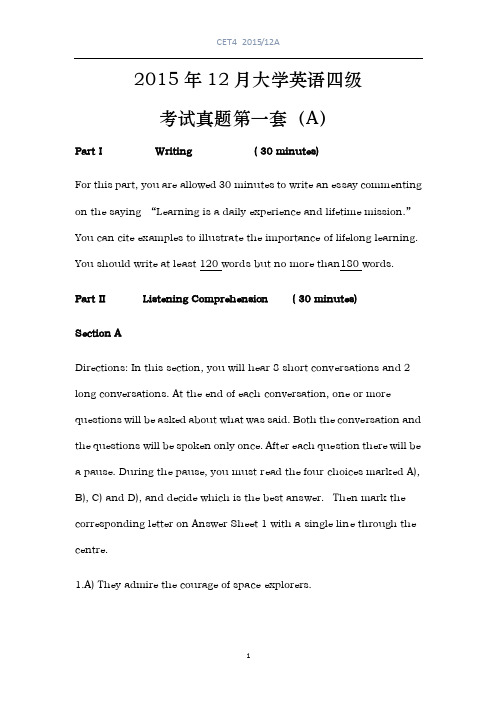
2015年12月大学英语四级考试真题第一套(A)Part I Writing ( 30 minutes)For this part, you are allowed 30 minutes to write an essay commenting on the saying ‚Learning is a daily experience and lifetime mission.‛You can cite examples to illustrate the importance of lifelong learning. You should write at least 120 words but no more than180 words.Part II Listening Comprehension ( 30 minutes)Section ADirections: In this section, you will hear 8 short conversations and 2 long conversations. At the end of each conversation, one or more questions will be asked about what was said. Both the conversation and the questions will be spoken only once. After each question there will be a pause. During the pause, you must read the four choices marked A), B), C) and D), and decide which is the best answer. Then mark the corresponding letter on Answer Sheet 1 with a single line through the centre.1.A) They admire the courage of space explorers.B) They enjoyed the movie on space exploration.C) They were going to watch a wonderful movie.D) They like doing scientific exploration very much.2.A) At a gift shop.B) At a graduation ceremony.C) In the office of a travel agency.D) In a school library.3.A) He used to work in the art gallery.B) He does not have a good memory.C) He declined a job offer form the art gallery.D) He is not interested in any part-time jobs.4.A) Susan has been invited to give a lecture tomorrow.B) He will go to the birthday party after the lecture.C) The woman should have informed him earlier.D) He will be unable to attend the birthday party.5.A) Reward those having made good progress.B) Set a deadline for the staff to meet.C) Assign more workers to the project.D) Encourage the staff to work in small groups.6.A) The way to the visitor’s parking.B) The rate for parking in Lot C.C) How far away the parking lot is.D) Where she can leave her car.7.A) He regrets missing the classes.B) He plans to take the fitness classes.C) He is looking forward to a better life.D) He has benefited form exercise.8.A) How to ? work efficiency.B) How to select secretaries.C)The responsibilities of secretaries.D) The secretaries in the man’s company.Conversation OneQuestions 9 to 11 are based on the conversation you have just heard.9.A) It is more difficult to learn than English.B) It is used by more people than English.C) It will be as commonly used as English.D) It will eventually become a world language.10.A) It has words words from many languages,B) Its popularity with the common people.C) The influence of the British Empire.D) The effect of the Industrial Revolution.11.A) It includes a lot of words form other languages.B) It has a growing number of newly coined words,C) It can be easily picked up by overseas travelers.D) It is the largest among all languages in the world. Conversation 2Questions 12 to 15 are based on the conversation you have just heard.12.A) To return some goods.B) To apply for a job.C) To place an order.D) To make a complaint.13.A) He has become somewhat impatient with the woman.B) He is not familiar with the exact details of goods.C) He has not worked in the sales department for long.D) He works on a part-time basis for the company.14.A) It is not his responsibility.B) It will be free for large orders.C) It costs 15 more for express delivery.D) It depends on a number of factors.15.A) Report the information to her superior.B) Pay a visit to the saleswoman in charge.C) Ring back when she comes to a decision.D) Make inquiries with some other companies.Section BDirections:In this section, you will hear 3 short passages. At the end of each passage, you will hear some questions. Both the passage and the questions will be spoken only once. After you hear a question, you must choose the best answer from the four choices marked A), B), C) and D ). Then mark the corresponding letter on Answer Sheet I with a single line through the centre.Passage OneQuestions 16 to 18 are based on the passage you have just heard.16. A) No one knows exactly where they were ?B) No one knows for sure when thy came into being.C) No one knows for what purpose they were ?D) No one knows what they will ?17. A) Carry ropes across rivers.B) Measure the speed of wind.C) Pass on secret messages.D) Give warnings of danger.18. A) To protect houses against lightning.B) To test the effects of the lightning rod.C) To find out the strength of silk for kites.D) To prove the lightning is electricity.Passage TwoQuestions 19 to 22 are based on the passage you have just heard.19.A) She enjoys teaching languages.B) She can speak several languages.C) She was trained to be an interpreter.D) She was born with a talent for languages.20. A) They acquire an immunity to culture shock.B) They would like to live abroad permanently.C) They want to learn as many foreign languages as possible.D) They have an intense interest in cross-cultural interactions.21.A) She became an expert in horse racing.B) She got a chance to visit several European countries.C) She was able to translate for a German sports judge.D) She learned to appreciate classical music.22. A) Taste the beef and give her comment.B) Take part in a cooking competition.C) Teach vocabulary for food in ??D) Give cooking lessons onPassage ThreeQuestions 23 to 25 are based on the passage you have just heard.23. A) He had only a third-grade education.B) He once threatened to kill his teacher.C) He grew up in a poorD) He often helped his24.A) Careless.B) Stupid.C) Brave.D) Active.25.A) Write two book reports a week.B) Keep a diary.C) Help with housework.D) Watch education??Section CDirections:In this section, you will hear a passage three times. When the passage is read for the first time, you should listen carefully for its general idea. When the passage is read for the second time, you are required to fill in the blanks with the exact words you have just heard.Finally, when the passage is read for the third time, you should check what you have written.When you look up at the night sky,what do you see?There are other 26 bodies out there besides the moon and stars。
大学英语四级考试简介

大学英语四级考试简介大学英语四级考试(CET-4)是针对大学生的英语水平进行的一项全国性考试,由国家教育部主导,各高校英语教育部门负责实施。
考试旨在评估考生在英语听、读、写、译等方面的能力,是衡量大学生英语能力的重要标准之一。
历史背景大学英语四级考试始于1987年,当时主要面向本科大学英语教学,逐步发展成为全国性的英语水平测试。
在过去的几十年里,CET-4不断进行改革和创新,以适应不断变化的教育环境和考试需求。
科目设置CET-4主要包含四个部分:听力、阅读理解、翻译和写作。
其中,听力部分占35%,阅读理解占35%,翻译和写作各占15%。
此外,还有7%的语法结构和词汇测试,以评估考生的语言基础知识。
考试形式CET-4通常在每年的6月和12月举行,具体时间以教育部的通知为准。
考试时间为90分钟,满分为710分。
每个部分都有各自的时间限制和分值权重,考生需要合理分配时间,尽可能在规定时间内完成所有题目。
难度分析CET-4的难度主要集中在中等水平,考察的是大学生在日常生活和学术环境中运用英语的能力。
虽然四个部分各有难点,但阅读理解和听力部分往往是最具挑战性的。
阅读理解要求考生具备较高的阅读速度和理解能力,而听力部分则需要考生具备较好的听力技巧和瞬间记忆能力。
备考建议为了顺利通过CET-4,考生需要提前制定备考计划,充分准备。
建议考生多做模拟试题,熟悉考试形式和题型,提高答题速度和准确率。
在听力部分,可以通过多听英语广播、新闻和音乐等提高听力水平。
在阅读理解部分,可以选择一些英语原版书籍、报纸和杂志进行阅读,提高阅读速度和理解能力。
在翻译和写作部分,可以多进行英语作文的练习和翻译训练,提高语言表达和翻译能力。
个人观点对于备考CET-4的考生来说,最重要的是保持积极的心态和勤奋的态度。
不要把考试看成是负担,而是将其作为一个提高自己英语水平的机会。
在备考过程中,要注重积累英语知识和技能,不断提高自己的听、说、读、写、译能力。
英语四级考试介绍

英语四级考试介绍
英语四级考试,全称为大学英语四级考试(College English Test, CET-4),是中国教育部主管的一项全国性英语水平考试。
该考试旨在评估考生在英语听、说、读、写四个方面的综合能力,对于大学生的英语学习和应用具有重要意义。
英语四级考试分为两个部分:听力和阅读、写作。
听力部分包括听力理解和听力填空两个部分,考察考生对于英语听力材料的理解和应用能力。
阅读、写作部分包括阅读理解、翻译和写作三个部分,考察考生对于英语阅读材料的理解和分析能力,以及写作能力。
英语四级考试每年举行两次,分别在6月和12月进行。
考试时间为两个半小时,其中听力部分占30分钟,阅读、写作部分占两个小时。
考试成绩以六级制进行评定,及格分数为425分,满分为710分。
英语四级考试对于大学生来说具有重要意义。
首先,通过四级考试,大学生可以证明自己具备一定的英语水平,为将来的就业和学习提供有力的证明。
其次,四级考试可以帮助大学生提高英语综合能力,培养良好的英语学习习惯和方法。
最后,四级考试还可以促进大学英语教学的改革和提高,推动英语教育的发展。
为了备考英语四级考试,考生可以通过参加培训班、自主学习、刷题
等方式进行准备。
同时,平时要多听英语、多读英语,提高听说读写的能力。
此外,还可以参加模拟考试,熟悉考试形式和要求,提高应试能力。
总之,英语四级考试是中国大学生英语学习的重要里程碑,通过努力备考和提高英语水平,考生可以取得优异的成绩,为将来的学习和就业打下坚实的基础。
2015年12月英语四级(CET4)真题试卷及答案(第一套)

Part I Writing ( 30 minutes)For this part, you are allowed 30 minutes to write an essay commenting on the saying “Learning is a daily experience and lifetime mission.”You can cite examples to illustrate the importance of lifelong learning. You should write at least 120 words but no more than180words.Part II Listening Comprehension ( 30 minutes)Section ADirections: In this section, you will hear 8 short conver sat ions and 2 long conversations. At the end of each conversation, one or more questions will be asked about what was said. Both the conversation and the questions will be spoken only once. After each question there will be a pause. During the pause, you must read the four choices marked A), B), C) and D), and decide which is the best answer. Then mark the corresponding letter on Answer Sheet 1 with a single line through the centre.A) They admire the courage of space explorers.B) They enjoyed the movie on space exploration.C) They were going to watch a wonderful movie.D) They like doing scientific exploration very much.2. A) At a gift shop.B) At a graduation ceremony.C) In the office of a travel agency.D) In a school library.3. A) He used to work in the art gallery.B) He does not have a good memory.C) He declined a job offer form the art gallery.D) He is not interested in any part-time jobs.4.A) Susan has been invited to give a lecture tomorrow.B) He will go to the birthday party after the lecture.C) The woman should have informed him earlier.D) He will be unable to attend the birthday party.5.A) Reward those having made good pro gre ss.B) Set a deadline for the staff to meet.C) Assign more workers to the project.D) Encourage the staff to work in small groups.6. A) The way to the visitor’s parking.B) The rate for parking in Lot C.C) How far away the parking lot is.D) Where she can leave her car.7. A) He regrets missing the classes.B) He plans to take the fitness classes.C) He is looking forward to a better life.D) He has benefited form exercise.8.A) How to ? work efficiency.B) How to select secretaries.C)The responsibilities of secretaries.D) The secretaries in the man’s company.Conver sat ion OneQuestions 9 to 11 are based on the conversation you have just heard.9.A) It is more difficult to learn than English.B) It is used by more people than English.C) It will be as commonly used as English.D) It will eventually bec ome a world language.10.A) It has words words from many languages,B) Its popularity with the common people.C) The influence of the British Empire.D) The effect of the Industrial Revolution.11.A) It includes a lot of words form other languages.B) It has a growing number of newly coined words,C) It can be easily picked up by overseas travelers.D) It is the largest among all languages in the world.Conversation 2Questions 12 to 15 are based on the conversation you have just heard.12.A) To return some goods.B) To apply for a job.C) To place an order.D) To make a complaint.13. A) He has become somewhat impatient with the woman.B) He is not familiar with the exact details of goods.C) He has not worked in the sales department for long.D) He works on a part-time basis for the company.14. A) It is not his responsibility.B) It will be free for large orders.C) It costs 15 more for express delivery.D) It depends on a number of factors.15.A) Report the information to her superior.B) Pay a visit to the saleswoman in charge.C) Ring back when she comes to a decision.D) Make inquiries with some other companies.Section BDirections:In this section, you will hear 3 short passages. At the end of each passage, you will hear some questions. Both the passage and the questions will be spoken only once. After you hear a question, you must choose the best answer from the four choices marked A), B), C) and D ). Then mark the corresponding letter on Answer Sheet I with a single line through the centre.Passage OneQuestions 16 to 18 are based on the passage you have just heard.16. A) No one knows exactly where they were ??B) No one knows for sure when thy came into being.C) No one knows for what purpose they were ?D) No one knows what they will17. A) Carry ropes across rivers.B) Measure the speed of wind.C) Pass on secret messages.D) Give warnings of danger.18. A) To protect houses against lightning.B) To test the effects of the lightning rod.C) To find out the strength of silk for kites.D) To prove the lightning is electricity.Passage TwoQuestions 19 to 22 are based on the passage you have just heard.19.A) She enjoys teaching languages.B) She can speak several languages.C) She was trained to be an interpreter.D) She was born with a talent for languages.20. A) They acquire an immunity to culture shock.B) They would like to live abroad permanently.C) They want to learn as many foreign languages as possible.D) They have an intense interest in cross-cultural interactions.21.A) She bec ame an expert in horse racing.B) She got a chance to visit several European countries.C) She was able to translate for a German sports judge.D) She learned to appreciate classical music.22. A) Taste the beef and give her comment.B) Take part in a cooking competition.C) Teach vocabulary for food in ??D) Give cooking lessons onPassage ThreeQuestions 23 to 25 are based on the passage you have just heard.23. A) He had only a third-grade education.B) He once threatened to kill his teacher.C) He gre w up in a poorD) He often helped his24.A) Careless.B) Stupid.C) Brave.D) Active.25.A) Write two book reports a week.B) Keep a diary.C) Help with housework.D) Watch education??Section CDirections:In this section, you will hear a passage three times. When the passage is read for the first time, you should listen carefully for its general idea. When the passage is read for the second time, you are required to fill in the blanks with the exact words you have just heard. Finally, when the passage is read for the third time, you should check what you have written.When you look up at the night sky, what do you see?There are other bodies out there besides the moon and stars. One of the most of this is a comet. Comets were formed around the same the earth was formed. They are made up of ice and other frozen liquids andgasses. these dirty snow balls begin to orbit the sun just as the planets do. As a comet gets closer to the sun, some gasses in it begin to unfreeze. They combine with dust particles from the comet to form a huge cloud. As the comet gets even nearer to the sun and solar wind blows the cloud behind the comet thus forming its tail. The tail and generally fuzzy atmosphere around the comet are that can help this phenomenon in the night sky. In any given year,about dozen known comets come close to the sun in their orbits. The average person can’t see them all of course. Usually there is only one or two a year bright enough to be seen withthe _________eye. Comet Hale-Bopp discovered in 1995 was an unusually bright comet. Its orbit bought it _________to the earth within 122 million miles of it. But Hale-Bopp came a long way on its earthly visit. It won’t be back for another 4 thousand years or so.Part ШReading Comprehension (40 minutes)Section ADirections: In this section, there is a passage with ten blanks. You are required to select one word for each blank from a list of choices givenin a word bank following the passage. Read the passage through carefully before making your choices. Each choice in the bank is identified by a letter. Please mark the corresponding letter for each item on Answer Sheet 2 with a single line through the centre. You may not use any of the words in the bank more than once.Questions 36 to 45 are based on the following passage.For many Americans, 2013 ended with an unusually bitter cold spell. November and December 36 early snow and bone-chilling temperatures in much of the country, part of a year when, for the first time in two 37 , record-cold days will likely turn out to have outnumberedrecord-warm ones. But the U.S. was the exception; November was the warmest ever 38 , and current data indicates that 2013 is likely to have been the fourth hottest year on record.Enjoy the snow now, bec ause 39 are good that 2014 will be even hotter, perhaps the hottest year since records have been kept. That’s because, scientists are predicting, 2014 will be an EI Niuo year.EI niuo, Spanish for “the child”, 40 when surface ocean waters in the southern Pacific become abnorm ally warm. So large is the Pacific, covering 30% of the planet’s surface, thatthe 41 energy generated by its warming is enough to touch off a series of weather changes around the world. EI Ninos are 42 with abnormally dry conditions in Southeast Asia and Australia. They can lead to extreme rain in parts of North and South America, even as southern Africa 43 dry weather. Marine life may be affected too; EI Ninos can 44 the rising of the cold, nutrient-rich(营养丰富的)water that supports large fish 45 ,and the unusually warm ocean temperatures can destroy coral(珊瑚).注意:此部分试题请在答题卡2上作答。
2015年12月英语4级全版真题及参考答案

2015年12月英语4级全版真题及参考答案机密★启用前版权所有大学英语四级考试COLLEGE ENGLISH TEST-Band Four-(4WZSHI)试题册☆☆☆☆☆☆☆☆☆☆☆☆☆☆☆☆☆☆☆☆☆☆☆☆☆☆☆☆☆☆☆☆☆☆☆☆☆☆☆敬告考生一、在答题前,请认真完成以下内容:1. 请检查试题册背面条形码粘贴条、答题卡的印刷质量,如有问题及时向监考员反映,确认无误后完成以下两点要求。
2. 请将试题册背面条形码粘贴条揭下后粘贴在答题卡1 的条形码粘贴框内,并将姓名和准考证号填写在试题册背面相应位置。
3.请在答题卡1和答题卡2 指定位置用黑色签字笔填写准考证号、姓名和学校名称,并用HB-2B 铅笔将对应准考证号的信息点涂黑。
二、在考试过程中,请注意以下内容:1. 所有题目必须在答题卡上规定位置作答,在试题册上或答题卡上非规定位置的作答一律无效。
2. 请在规定时间内在答题卡指定位置依次完成作文、听力、阅读、翻译各部分考试,作答作文期间不得翻阅该试题册。
听力录音播放完毕后,请立即停止作答,监考员将立即回收答题卡1 ,得到监考员指令后方可继续作答。
3. 作文题内容印在试题册背面,作文题及其他主观题必须用黑色签字笔在答题卡指定区域内作答。
4.选择题均为单选题,错选、不选或多选将不得分,作答时必须使用HB-2B铅笔在答题卡上相应位置填涂,修改时须用橡皮擦净。
三、以下情况按违规处理:1. 不正确填写(涂)个人信息,错贴、不贴、毁损条形码粘贴条。
2. 未按规定翻阅试题册、提前阅读试题、提前或在收答题卡期间作答。
3. 未用所规定的笔作答、折叠或毁损答题卡导致无法评卷。
4. 考试期间在非听力考试时间佩戴耳机。
Section A Litstening Comprehension(30 minutes)Directions: In this section, you will hear8 short conversations and 2 longconversations. At the end of eachconversation. one or morequestions will be asked about whatwas said. Both the conversationand the questions will be spokenonly once. After each questionthere will be a pause. During thepause, you must read the fourchoices marked A), B), C) and D),and decide which is the bestanswer. Then mark thecorresponding letter on AnswerSheet 1 with a single line throughthe centre.注意:此部分试题请在答题卡1 上作答1. A) They admire the courage of space explorersB) They enjoyed the movie on space explorationC) They were going to watch a wonderful movieD) They like doing scientific exploratron very much2. A)At a gift shopB) At a graduation ceremony.C) In the office of a travel agencyD) In a school library3. A) He used to work in the art galleryB) He does not have a good memoryC) He declined a job offer from the art galleryD) He is not interested in any part-time jobs4. A) Susan has been invited to give a lecture tomorrowB) He will go to the birthday party after the lectureC) The woman should have informed him earlierD) He will be unable to attend the birthday party5. A) Reward those having made good progressB) Set a deadline for the staff to meetC) Assign more workers to the project.D) Encourage the staff to work in Small groups6. A) The way to the visitor's parkingB) The rate for parking in Lot CC) How far away the parking lot is.D) Where she can leave her car.7. A) He regrets missing the classesB) He plans to take the fitness classes.C) He is looking forward to a better lifeD) He has benefited from exercise8. A) How to raise work efficiency.B) How to select secretariesC) The responsibilities of secretanesD) The secretaries in the man’s company. Questions 9 to 11 are based on the conversation you have just heard.9 A) It Is more difficult to learn than EnglishB) It is used by more people than English.C) It will be as commonly used as EnglishD) It will eventually become a world language10. A) Its loan words from many languagesB) Its popularity with the common people.C) The influence of the British EmpireD) The effect of the Industrial Revolution11. A) It includes a lot of words from other languagesB) It has a growing number of newly coined wordsC) It can be easily picked up by overseas travellersD) It is the largest among all languages in the worldQuestions 12 to 15 are based on the conversation you have just heard.12. A) To return some goodsB) To apply for a job.C) To place an order.D) To make a complaint13. A) He has become somewhat impatient with the womanB) He is not familiar with the exact details of the goodssC) He has not worked in the sales department for long.D) He works on a part-time basis for the company14. A) it is not his responsibilityB) It will be free for large ordersC) It costs £15 more for express deliveryD) It depends on a number of factors15. A) Report the information to her superiorB) Pay a visit to the saleswoman in chargegeC) Ring back when she comes to a decisionD) Make inquiries with some other companiesSection BDirections: In this section, you will hear3 short passages. At the end ofeach passage, you will hear somequestions. Both the passage andthe questions will be spoken onlyonce.After you hear a queslion,you must choose the best answerfrom the four choices marked A),B), C) and D). Then mark thecorresponding leltert on AnswerSheet 1 with a single line throughthe centre注意:此部分试题请在答题卡1 上作答。
2015年12月英语4级全版真题及参考答案

机密★启用前版权所有大学英语四级考试COLLEGE ENGLISH TEST-Band Four-(4WZSHI)试题册☆☆☆☆☆☆☆☆☆☆☆☆☆☆☆☆☆☆☆☆☆☆☆☆☆☆☆☆☆☆☆☆☆☆☆☆☆☆☆敬告考生一、在答题前,请认真完成以下内容:1. 请检查试题册背面条形码粘贴条、答题卡的印刷质量,如有问题及时向监考员反映,确认无误后完成以下两点要求。
2. 请将试题册背面条形码粘贴条揭下后粘贴在答题卡1 的条形码粘贴框内,并将姓名和准考证号填写在试题册背面相应位置。
3.请在答题卡1和答题卡2 指定位置用黑色签字笔填写准考证号、姓名和学校名称,并用HB-2B 铅笔将对应准考证号的信息点涂黑。
二、在考试过程中,请注意以下内容:1. 所有题目必须在答题卡上规定位置作答,在试题册上或答题卡上非规定位置的作答一律无效。
2. 请在规定时间内在答题卡指定位置依次完成作文、听力、阅读、翻译各部分考试,作答作文期间不得翻阅该试题册。
听力录音播放完毕后,请立即停止作答,监考员将立即回收答题卡1 ,得到监考员指令后方可继续作答。
3. 作文题内容印在试题册背面,作文题及其他主观题必须用黑色签字笔在答题卡指定区域内作答。
4.选择题均为单选题,错选、不选或多选将不得分,作答时必须使用HB-2B铅笔在答题卡上相应位置填涂,修改时须用橡皮擦净。
三、以下情况按违规处理:1. 不正确填写(涂)个人信息,错贴、不贴、毁损条形码粘贴条。
2. 未按规定翻阅试题册、提前阅读试题、提前或在收答题卡期间作答。
3. 未用所规定的笔作答、折叠或毁损答题卡导致无法评卷。
4. 考试期间在非听力考试时间佩戴耳机。
Section A Litstening Comprehension (30 minutes)Directions: In this section, you will hear 8 short conversations and 2 long conversations. At the end of each conversation. one or more questions will be asked about what was said.Both the conversation and the questions will be spoken only once. After eachquestion there will be a pause. During the pause, you must read the four choicesmarked A), B), C) and D), and decide which is the best answer. Then mark thecorresponding letter on Answer Sheet 1 with a single line through the centre.注意:此部分试题请在答题卡1 上作答1. A) They admire the courage of space explorersB) They enjoyed the movie on space explorationC) They were going to watch a wonderful movieD) They like doing scientific exploratron very much2. A)At a gift shopB) At a graduation ceremony.C) In the office of a travel agencyD) In a school library3. A) He used to work in the art galleryB) He does not have a good memoryC) He declined a job offer from the art galleryD) He is not interested in any part-time jobs4. A) Susan has been invited to give a lecture tomorrowB) He will go to the birthday party after the lectureC) The woman should have informed him earlierD) He will be unable to attend the birthday party5. A) Reward those having made good progressB) Set a deadline for the staff to meetC) Assign more workers to the project.D) Encourage the staff to work in Small groups6. A) The way to the visitor's parkingB) The rate for parking in Lot CC) How far away the parking lot is.D) Where she can leave her car.7. A) He regrets missing the classesB) He plans to take the fitness classes.C) He is looking forward to a better lifeD) He has benefited from exercise8. A) How to raise work efficiency.B) How to select secretariesC) The responsibilities of secretanesD) The secretaries in the man’s company.Questions 9 to 11 are based on the conversation you have just heard.9 A) It Is more difficult to learn than EnglishB) It is used by more people than English.C) It will be as commonly used as EnglishD) It will eventually become a world language10. A) Its loan words from many languagesB) Its popularity with the common people.C) The influence of the British EmpireD) The effect of the Industrial Revolution11. A) It includes a lot of words from other languagesB) It has a growing number of newly coined wordsC) It can be easily picked up by overseas travellersD) It is the largest among all languages in the worldQuestions 12 to 15 are based on the conversation you have just heard.12. A) To return some goodsB) To apply for a job.C) To place an order.D) To make a complaint13. A) He has become somewhat impatient with the womanB) He is not familiar with the exact details of the goodssC) He has not worked in the sales department for long.D) He works on a part-time basis for the company14. A) it is not his responsibilityB) It will be free for large ordersC) It costs £15 more for express deliveryD) It depends on a number of factors15. A) Report the information to her superiorB) Pay a visit to the saleswoman in chargegeC) Ring back when she comes to a decisionD) Make inquiries with some other companiesSection BDirections: In this section, you will hear 3 short passages. At the end of each passage, you will hear some questions. Both the passage and the questions will be spoken onlyonce.After you hear a queslion, you must choose the best answer from the fourchoices marked A), B), C) and D). Then mark the corresponding leltert on AnswerSheet 1 with a single line through the centre注意:此部分试题请在答题卡1 上作答。
2015年12月一二三卷大学英语四级考试真题及答案汇总
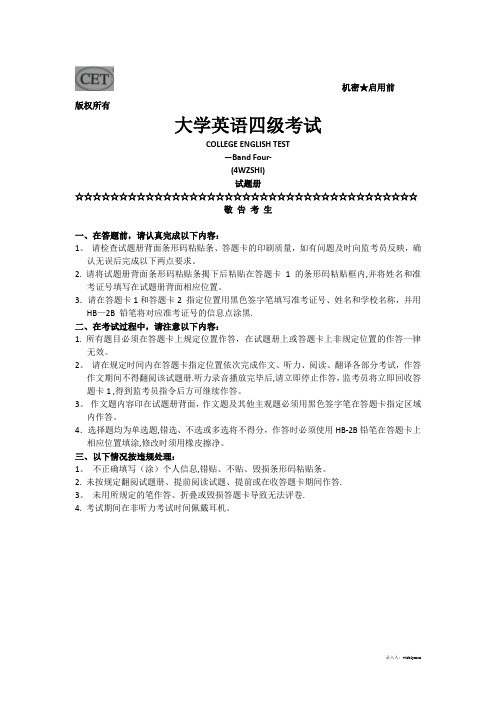
机密★启用前版权所有大学英语四级考试COLLEGE ENGLISH TEST—Band Four-(4WZSHI)试题册☆☆☆☆☆☆☆☆☆☆☆☆☆☆☆☆☆☆☆☆☆☆☆☆☆☆☆☆☆☆☆☆☆☆☆☆☆☆☆敬告考生一、在答题前,请认真完成以下内容:1。
请检查试题册背面条形码粘贴条、答题卡的印刷质量,如有问题及时向监考员反映,确认无误后完成以下两点要求。
2. 请将试题册背面条形码粘贴条揭下后粘贴在答题卡1 的条形码粘贴框内,并将姓名和准考证号填写在试题册背面相应位置。
3.请在答题卡1和答题卡2 指定位置用黑色签字笔填写准考证号、姓名和学校名称,并用HB—2B 铅笔将对应准考证号的信息点涂黑.二、在考试过程中,请注意以下内容:1. 所有题目必须在答题卡上规定位置作答,在试题册上或答题卡上非规定位置的作答一律无效。
2。
请在规定时间内在答题卡指定位置依次完成作文、听力、阅读、翻译各部分考试,作答作文期间不得翻阅该试题册.听力录音播放完毕后,请立即停止作答,监考员将立即回收答题卡1 ,得到监考员指令后方可继续作答。
3。
作文题内容印在试题册背面,作文题及其他主观题必须用黑色签字笔在答题卡指定区域内作答。
4.选择题均为单选题,错选、不选或多选将不得分,作答时必须使用HB-2B铅笔在答题卡上相应位置填涂,修改时须用橡皮擦净。
三、以下情况按违规处理:1。
不正确填写(涂)个人信息,错贴、不贴、毁损条形码粘贴条。
2. 未按规定翻阅试题册、提前阅读试题、提前或在收答题卡期间作答.3。
未用所规定的笔作答、折叠或毁损答题卡导致无法评卷.4. 考试期间在非听力考试时间佩戴耳机。
Section A Litstening Comprehension (30 minutes)Directions: In this section,you will hear 8 short conversations and 2 long conversations。
2015年大学英语四级考试题型一览

2015年大学英语四级考试题型一览2015年英语四级考试题型包括四大部分:作文、听力理解、阅读理解、翻译。
一、题型结构大学英语四级和六级的试卷结构、测试内容、测试题型、分值比例和考试时间如下表所示:二、题型描述1)写作写作部分测试学生用英语进行书面表达的能力,所占分值比例为15%,考试时间30分钟。
写作测试选用考生所熟悉的题材,要求考生根据所提供的信息及提示(如:提纲、情景、图片或图表等)写出一篇短文,四级120-180词,六级150-200词。
2)听力理解听力理解部分测试学生获取口头信息的能力。
录音材料用标准的英式或美式英语朗读,语速四级约每分钟130词,六级约每分钟150词。
听力部分分值比例为35%,其中对话占15%,短文占20%。
考试时间30分钟。
对话部分包括短对话和长对话,采用多项选择题的形式进行考核。
短对话有8段,每段提一个问题;长对话有2段,每段提3-4个问题;对话部分共15题。
每段对话均朗读一遍,每个问题后留有13-15秒的答题时间。
短文部分包括短文理解及单词和词组听写。
短文理解有3篇,采用多项选择题的形式进行考核。
四级每篇长度为220-250词,六级为240-270词。
每篇短文朗读一遍,提3-4个问题,每个问题后留有13-15秒的答题时间,共10题。
单词及词组听写采用1篇短文,四级的长度为220-250词,六级为240-270词。
要求考生在听懂短文的基础上用所听到的原文填写空缺的单词或词组,共10题。
短文播放三遍。
3)阅读理解阅读理解部分包括1篇长篇阅读和3篇仔细阅读,测试学生在不同层面上的阅读理解能力,包括理解篇章或段落的主旨大意和重要细节、综合分析、推测判断以及根据上下文推测词义等能力。
该部分所占分值比例为35%,其中长篇阅读占10%,仔细阅读占25%。
考试时间40分钟。
长篇阅读部分采用1篇较长篇幅的文章,总长度四级约1000词,六级约1200词。
阅读速度四级约每分钟100词;六级约每分钟120词。
2015年12月一二三卷大学英语四级考试真题及答案汇总
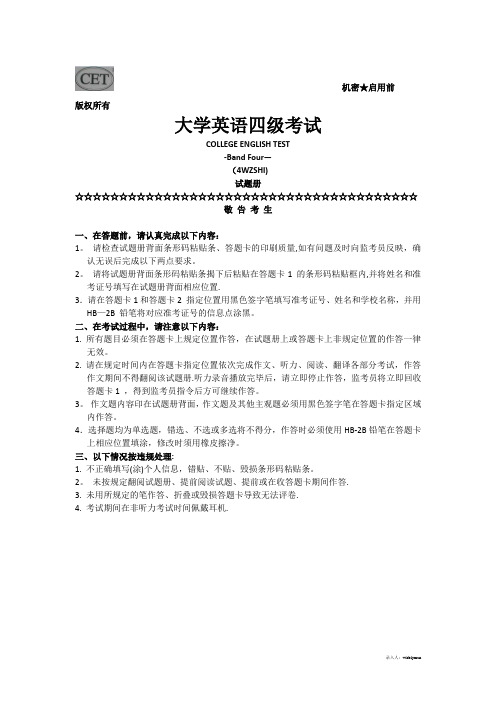
机密★启用前版权所有大学英语四级考试COLLEGE ENGLISH TEST-Band Four—(4WZSHI)试题册☆☆☆☆☆☆☆☆☆☆☆☆☆☆☆☆☆☆☆☆☆☆☆☆☆☆☆☆☆☆☆☆☆☆☆☆☆☆☆敬告考生一、在答题前,请认真完成以下内容:1。
请检查试题册背面条形码粘贴条、答题卡的印刷质量,如有问题及时向监考员反映,确认无误后完成以下两点要求。
2。
请将试题册背面条形码粘贴条揭下后粘贴在答题卡1 的条形码粘贴框内,并将姓名和准考证号填写在试题册背面相应位置.3.请在答题卡1和答题卡2 指定位置用黑色签字笔填写准考证号、姓名和学校名称,并用HB—2B 铅笔将对应准考证号的信息点涂黑。
二、在考试过程中,请注意以下内容:1. 所有题目必须在答题卡上规定位置作答,在试题册上或答题卡上非规定位置的作答一律无效。
2. 请在规定时间内在答题卡指定位置依次完成作文、听力、阅读、翻译各部分考试,作答作文期间不得翻阅该试题册.听力录音播放完毕后,请立即停止作答,监考员将立即回收答题卡1 ,得到监考员指令后方可继续作答。
3。
作文题内容印在试题册背面,作文题及其他主观题必须用黑色签字笔在答题卡指定区域内作答。
4.选择题均为单选题,错选、不选或多选将不得分,作答时必须使用HB-2B铅笔在答题卡上相应位置填涂,修改时须用橡皮擦净。
三、以下情况按违规处理:1. 不正确填写(涂)个人信息,错贴、不贴、毁损条形码粘贴条。
2。
未按规定翻阅试题册、提前阅读试题、提前或在收答题卡期间作答.3. 未用所规定的笔作答、折叠或毁损答题卡导致无法评卷.4. 考试期间在非听力考试时间佩戴耳机.Section A Litstening Comprehension (30 minutes)Directions:In this section,you will hear 8 short conversations and 2 long conversations。
2015年英语四级
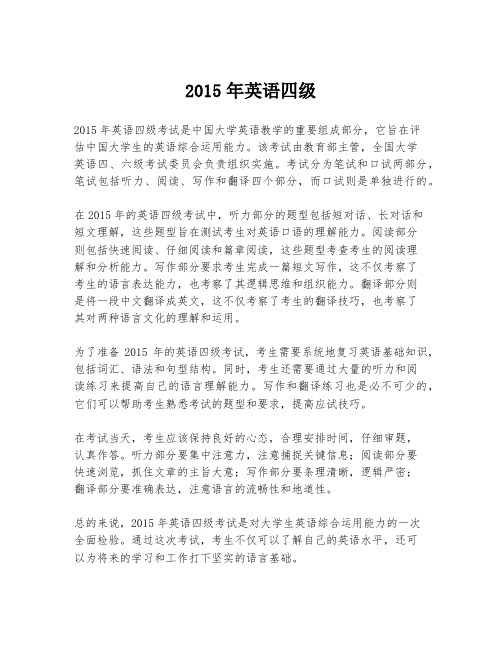
2015年英语四级
2015年英语四级考试是中国大学英语教学的重要组成部分,它旨在评
估中国大学生的英语综合运用能力。
该考试由教育部主管,全国大学
英语四、六级考试委员会负责组织实施。
考试分为笔试和口试两部分,笔试包括听力、阅读、写作和翻译四个部分,而口试则是单独进行的。
在2015年的英语四级考试中,听力部分的题型包括短对话、长对话和
短文理解,这些题型旨在测试考生对英语口语的理解能力。
阅读部分
则包括快速阅读、仔细阅读和篇章阅读,这些题型考查考生的阅读理
解和分析能力。
写作部分要求考生完成一篇短文写作,这不仅考察了
考生的语言表达能力,也考察了其逻辑思维和组织能力。
翻译部分则
是将一段中文翻译成英文,这不仅考察了考生的翻译技巧,也考察了
其对两种语言文化的理解和运用。
为了准备2015年的英语四级考试,考生需要系统地复习英语基础知识,包括词汇、语法和句型结构。
同时,考生还需要通过大量的听力和阅
读练习来提高自己的语言理解能力。
写作和翻译练习也是必不可少的,它们可以帮助考生熟悉考试的题型和要求,提高应试技巧。
在考试当天,考生应该保持良好的心态,合理安排时间,仔细审题,
认真作答。
听力部分要集中注意力,注意捕捉关键信息;阅读部分要
快速浏览,抓住文章的主旨大意;写作部分要条理清晰,逻辑严密;
翻译部分要准确表达,注意语言的流畅性和地道性。
总的来说,2015年英语四级考试是对大学生英语综合运用能力的一次
全面检验。
通过这次考试,考生不仅可以了解自己的英语水平,还可
以为将来的学习和工作打下坚实的语言基础。
大学英语四级简介
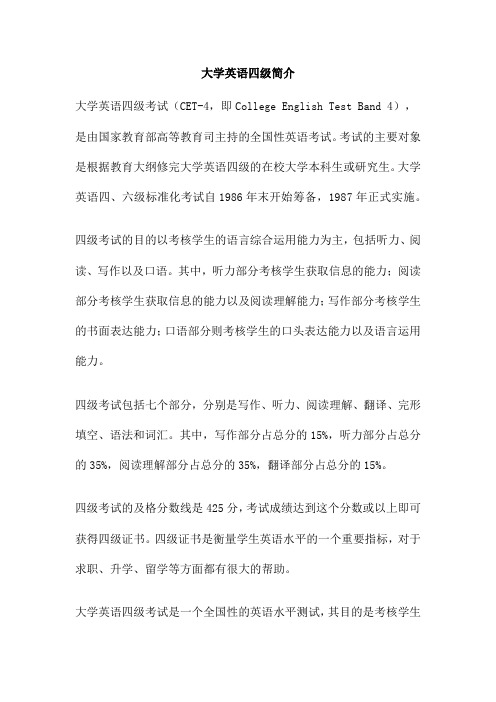
大学英语四级简介大学英语四级考试(CET-4,即College English Test Band 4),是由国家教育部高等教育司主持的全国性英语考试。
考试的主要对象是根据教育大纲修完大学英语四级的在校大学本科生或研究生。
大学英语四、六级标准化考试自1986年末开始筹备,1987年正式实施。
四级考试的目的以考核学生的语言综合运用能力为主,包括听力、阅读、写作以及口语。
其中,听力部分考核学生获取信息的能力;阅读部分考核学生获取信息的能力以及阅读理解能力;写作部分考核学生的书面表达能力;口语部分则考核学生的口头表达能力以及语言运用能力。
四级考试包括七个部分,分别是写作、听力、阅读理解、翻译、完形填空、语法和词汇。
其中,写作部分占总分的15%,听力部分占总分的35%,阅读理解部分占总分的35%,翻译部分占总分的15%。
四级考试的及格分数线是425分,考试成绩达到这个分数或以上即可获得四级证书。
四级证书是衡量学生英语水平的一个重要指标,对于求职、升学、留学等方面都有很大的帮助。
大学英语四级考试是一个全国性的英语水平测试,其目的是考核学生的语言综合运用能力,特别是获取、理解和表达信息的能力。
四级证书是很多单位和机构衡量人才英语水平的重要依据,因此对于大学生来说,通过四级考试是非常重要的。
大学英语四级考试简介大学英语四级考试(CET-4,即College English Test Band 4)是中国高等教育学生信息网(CHESICC)主办的一项全国性英语水平考试。
该考试主要针对中国高等院校的在校学生,旨在测试他们在大学阶段的英语水平。
大学英语四级考试包含五个部分:写作(Writing)、听力(Listening)、阅读理解(Reading Comprehension)、翻译(Translation)和词汇(Vocabulary)。
考试总时长为130分钟,满分为710分。
写作部分要求考生在30分钟内完成一篇至少120词的短文,主要测试学生的语言表达能力、语法和词汇量。
2015英语四级
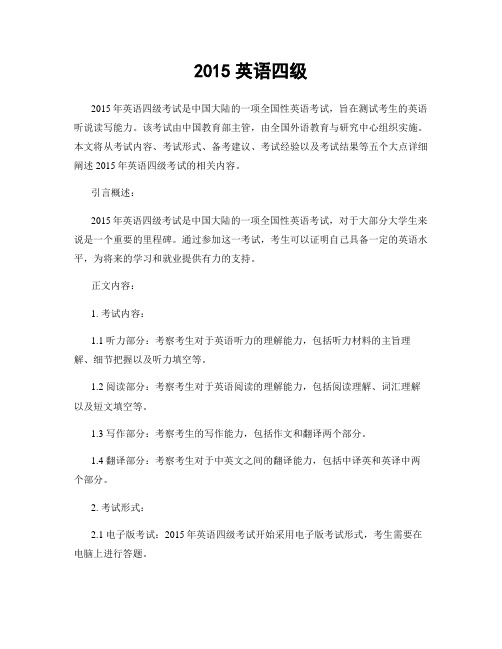
2015英语四级2015年英语四级考试是中国大陆的一项全国性英语考试,旨在测试考生的英语听说读写能力。
该考试由中国教育部主管,由全国外语教育与研究中心组织实施。
本文将从考试内容、考试形式、备考建议、考试经验以及考试结果等五个大点详细阐述2015年英语四级考试的相关内容。
引言概述:2015年英语四级考试是中国大陆的一项全国性英语考试,对于大部分大学生来说是一个重要的里程碑。
通过参加这一考试,考生可以证明自己具备一定的英语水平,为将来的学习和就业提供有力的支持。
正文内容:1. 考试内容:1.1 听力部分:考察考生对于英语听力的理解能力,包括听力材料的主旨理解、细节把握以及听力填空等。
1.2 阅读部分:考察考生对于英语阅读的理解能力,包括阅读理解、词汇理解以及短文填空等。
1.3 写作部分:考察考生的写作能力,包括作文和翻译两个部分。
1.4 翻译部分:考察考生对于中英文之间的翻译能力,包括中译英和英译中两个部分。
2. 考试形式:2.1 电子版考试:2015年英语四级考试开始采用电子版考试形式,考生需要在电脑上进行答题。
2.2 网络考点:考生在指定的考点进行考试,考点之间通过网络联通,保证考试的同步和安全。
3. 备考建议:3.1 听力训练:多听英语听力材料,提高对于不同口音和语速的理解能力。
3.2 阅读练习:多读英语文章,提高阅读速度和理解能力。
3.3 写作练习:多写英语作文,提高写作表达能力和语法运用能力。
3.4 翻译练习:进行中英文之间的翻译练习,提高翻译准确性和语言流畅度。
4. 考试经验:4.1 时间掌握:合理分配各个部分的时间,不要在某一部分花费过多时间而导致其他部分时间不足。
4.2 答题技巧:对于听力和阅读部分,可以先阅读问题,然后有针对性地听或读相关内容,提高答题效率。
4.3 注意细节:在阅读和听力部分,注意细节信息的把握,以免因为一个小错误导致整个题目的错误。
5. 考试结果:5.1 成绩查询:考试成绩可以通过官方网站进行查询。
2015四级考试题型详解

• 1.In the eyes of the western, the basic food close st to China is rice. 2.Rice has long occupied so s ignificant a position in the diet of Chinese that there is a proverb “ Even a clever housewife canno t cook a meal without rice”.
• 第三句南北对比,可以用while或whereas连接,最后一句 也是对比句,主语people是比较泛的大主语,考虑改写为
被动句。
2015年6月四级翻译原文
中国是世界上最古老的文明之一。构成现在世界基础的许 多元素都起源于中国。中国现在拥有世界上发展最快的经 济,并经历着一次新的工业革命。中国还启动了雄心勃勃 的太空探索计划,其实包括到2020年建成一个太空站。目 前,中国是世界上最大的出口国之一,并正在吸引大量外 国投资。同时,它也在海外投资数十亿美元。2011年,中 国超越日本成为第二大经济体。
• 第二段:中心句+两原因+一例子,原因句型先果后因和先
• To sum up, this lifestyle is absolute ly imperfect. In order to lead a heal thy life, we are supposed to do more exercises and expose ourselves
2015四级作文参考例文
2015年大学英语四级考试题型
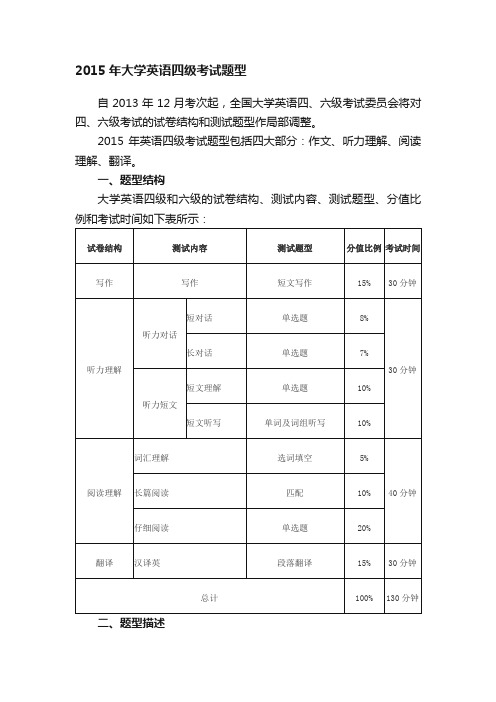
2015年大学英语四级考试题型自2013年12月考次起,全国大学英语四、六级考试委员会将对四、六级考试的试卷结构和测试题型作局部调整。
2015年英语四级考试题型包括四大部分:作文、听力理解、阅读理解、翻译。
一、题型结构大学英语四级和六级的试卷结构、测试内容、测试题型、分值比例和考试时间如下表所示:二、题型描述1)写作写作部分测试学生用英语进行书面表达的能力,所占分值比例为15%,考试时间30分钟。
写作测试选用考生所熟悉的题材,要求考生根据所提供的信息及提示(如:提纲、情景、图片或图表等)写出一篇短文,四级120-180词,六级150-200词。
2)听力理解听力理解部分测试学生获取口头信息的能力。
录音材料用标准的英式或美式英语朗读,语速四级约每分钟130词,六级约每分钟150词。
听力部分分值比例为35%,其中对话占15%,短文占20%。
考试时间30分钟。
对话部分包括短对话和长对话,采用多项选择题的形式进行考核。
短对话有8段,每段提一个问题;长对话有2段,每段提3-4个问题;对话部分共15题。
每段对话均朗读一遍,每个问题后留有13-15秒的答题时间。
短文部分包括短文理解及单词和词组听写。
短文理解有3篇,采用多项选择题的形式进行考核。
四级每篇长度为220-250词,六级为240-270词。
每篇短文朗读一遍,提3-4个问题,每个问题后留有13-15秒的答题时间,共10题。
单词及词组听写采用1篇短文,四级的长度为220-250词,六级为240-270词。
要求考生在听懂短文的基础上用所听到的原文填写空缺的单词或词组,共10题。
短文播放三遍。
3)阅读理解阅读理解部分包括1篇长篇阅读和3篇仔细阅读,测试学生在不同层面上的阅读理解能力,包括理解篇章或段落的主旨大意和重要细节、综合分析、推测判断以及根据上下文推测词义等能力。
该部分所占分值比例为35%,其中长篇阅读占10%,仔细阅读占25%。
考试时间40分钟。
长篇阅读部分采用1篇较长篇幅的文章,总长度四级约1000词,六级约1200词。
- 1、下载文档前请自行甄别文档内容的完整性,平台不提供额外的编辑、内容补充、找答案等附加服务。
- 2、"仅部分预览"的文档,不可在线预览部分如存在完整性等问题,可反馈申请退款(可完整预览的文档不适用该条件!)。
- 3、如文档侵犯您的权益,请联系客服反馈,我们会尽快为您处理(人工客服工作时间:9:00-18:30)。
短对话 长对话 听力短文 复合式听写
测试内容
测试题型
题量
分值比例
短篇新闻3段
选择题(单选)
7题
7%(每题1分)
长对话2篇
选择题(单选)
8题பைடு நூலகம்
8%(每题1分)
听力篇章3篇
选择题(单选)
10题
20%(每题2分)
试卷 结构
试卷 内容
测试内容
测试题型
比例
答题 时间
答题卡
篇章词汇理解
选词填空
10%
15 minutes
考前务必确认考场位置,如不清楚一定要提前去过考场,以免因找考 场耽误时间。 8点45允许考生入场,9:00以后禁止考生入场。 进场后按指定位置就坐,认真阅读黑板板书,确认收音机频率,进行 收音机试音等准备工作。如有问题立即提出。 考试中途不准退场,不能提前交卷。
9点下发答题卡1、2以及试题册。 拿到答题卡以后,正确填涂个人信息。
要求
写作内容
• 写作选用考生所熟悉的题材,包括社会、文化或日常生活 的一般常识,或者与英语学习相关的内容,如2011年6 月的四级考试作文题目为Online Shopping。
评分办法
阅卷工作由全国大学英语四、六级考试委员会负责组织,目前
采用电脑网上集中阅卷形式。
评分原则
以大学英语教学大纲四级教学要求为准则。 采用总体评分法(Global Scoring),不按语言点的错误数 目扣分。 从内容和语言两个方面对作文进行综合评判。 避免趋中倾向。该给高分的给高分,包括满分;该给低分的给 低分,包括0分。
很值钱!
长篇阅读:段落匹配题
篇章后附有10个句子,每句一题。每句所含的
信息出自篇章的某一段落,要求考生找出与每
句所含信息相匹配的段落。有的段落可能对应
两题,有的段落可能不对应任何一题。 建议
先题后文 关键词定位(key words positioning 同义替换 (paraphrasing)
仔细阅读
• 考生阅读三篇短文。两篇为单项选择题型的短 文理解测试(传统阅读),每篇长度为300— 350词。一篇为选词填空(Banked Cloze) 。 选词填空篇章长度为200—250词。
要求
考核能力
• 测试考生在不同层面上的阅读理解能力,包括 理解主旨大意和重要细节、综合分析、推测判 断以及根据上下文推测词义等。
用能力,为实现大学英语课程教学目标发挥积极作用。
从2005年1月起,报道成绩满分为710分。
总体格局
部分 1 2 3 5 试题类型 写作 阅读 听力 翻译 比例 15% 35% 35% 15% 分值 106.5分 248.5分 248.5分 106.5分
由此可见,阅读和听力是四级考试的重中之重!
仔细阅读——选词填空
命题形式为从一片文章(字数为200-250字左右) 中去掉10个单词,在文末给出15个单词供考生选择。 考察词汇主要包括四类实词,如动词、名词、形容 词,副词等。 考察能力:
阅读能力 根据上下文确切地理解句子意思的能力 语法和词汇运用能力 遣词造句的能力
目录
CET-4简介
总体格局
分值分布
答题顺序 试卷构成 题型分解
CET-4简 介
大学英语四级考试,即CET-4,College English Test Band 4的缩写。是由教育部高等教育司主持的一项大 规模标准化考试,每年举行两次。
其目的在于准确地衡量我国在校大学生的英语综合应
作文题目在试题册背面,因此看到题目后,可以立即开 始构思。 9点10分:开始使用黑色签字笔在答题卡1上作答,期间不得打 开试题册。 作文注意审题,务必确保文章内容切题,结构清晰。尽量避免 拼写、语法错误。保持卷面整洁。 考生非听力考试期间不得佩戴耳机 “听力录音播放完毕后,将立即回收答题卡1”。 题量大,注意掌控时间。特别是阅读和翻译部分。 不要在一个题目上停留过多时间,以免影响整体得分。 翻译一定不要不翻或者漏翻。
11:15 监考老师口头提示考生10分钟后结束考试 11:25 考试结束,监考老师收回试题册及答题卡2
题型分解
写作
• 测试学生用英语进行书面表达的能力。
目的
• 考生在30分钟内,根据规定的题目和所提供的提纲、情 景、图片或图表等,写出一篇不少于120词的短文。 • 要求思想表达准确、意义连贯、无严重语法错误。
Part 3
阅读
长篇阅读理解
段落匹配题 25% Answer 25 minutes Sheet 2
篇章阅读理解
单项选择
Part 4
翻译
篇章翻译
汉译英
15%
30minutes
答题顺序
作文
听力结束立即 收答题卡1, 没有时间填涂
听力
选词填空 段落匹配
在答题卡1上作答, 完 成后交答题卡1.其余 题目在答题卡2上作答。
Assignments--week 2
1. vocabulary: track 1, 2 &3 2. finish the test paper of 2014.12(1) and check the answer(writing: optional)
翻译须符合英语的语法结构和表达习惯,要求用词准确。
CET4注意事项
四级考前早饭一定要吃。 带好证件(身份证、学生证、准考证)以及考试用品。
尤其是耳机之前一定要试音,确保可以清晰收听,到 时考试中耳机有问题收听不了就麻烦了。 MP3不能用的,只可以用收音机听听力题目。 2B铅笔、橡皮、黑色水笔、手表。原子笔不许用,蓝 色水笔不能用。修正液等不可用。 手机必须关机,因此不能做手表用。
注:白卷,作文与题目毫不相关,或只有几个孤立的词而无法 表达思想,则给0分。
听力
短篇 新闻
3篇,7个问题,7分,题材为新闻报道、演讲。
长对 话 听力 篇章
2篇,8个问题,8分,题材为校园类、企业工作类、 预定酒店、问路、采访等。
3篇,10个问题,20分,题材为科技、商业、医学、 人物传记、故事事件等。
仔细阅读——传统阅读
单项选择题型的短文后有若干个问题,考生根据对 文章的理解,从每题的四个选项中选择最佳答案。 该题型为考生熟悉,故不赘述。
汉译英
题型:
原单句汉译英调整为段落汉译英。翻译内容涉及中国的历史、 文化、经济、社会发展等。四级长度为140-160个汉字;六 级长度为180-200个汉字。
分值分布
写作 (15%)
阅读 (35%)
听力 (35%)
翻译 (15%)
试卷构成
试卷 试卷 测试内容 结构 内容 测试题型 比例 答题 时间 答题卡
Part 写作 1
写作
短文写作
15%
8% 7% 10% 10%
30 minutes
Answer Sheet 1 30 minutes
听力 对话
Part 2 听力 理解
翻译
传统阅读
大学英语四级考试流程
8:40 考生入场,核对听力调频并试音 9:00 下发考试材料 9:10 考试正式开始,考生开始作答作文 9:35 监考老师口头提醒5分钟后开始听力考试 9:40 听力考试开始,考生注意及时填涂答题卡1 10:10 听力考试结束,监考老师收回答题卡1
10:15 考试继续进行,考生完成阅读理解和翻译部分
God Help Those Who Help Themselves!
I promise
I promise to Jojo that I'll listen to her, finish her homework, and will not give up even though I meet difficulties. I'll try my very best to pass Cet-4 this time, not next time. 2016.9.7
评分标准(满分为15分)
2分— 条理不清,思路紊乱,语言支离破碎或大部分句子均有 错误,且多数为严重错误。 5分— 基本切题。表达思想不清楚,连贯性差。有较多的严重 语言错误。 8分— 基本切题。有些地方表达思想不够清楚,文字勉强连贯; 语言错误相当多,其中有一些是严重错误。 11分— 切题。表达思想清楚,文字连贯,但有少量语言错误。 14分— 切题。表达思想清楚,文字通顺,连贯性较好,基本 上无语言错误,仅有个别小错。
